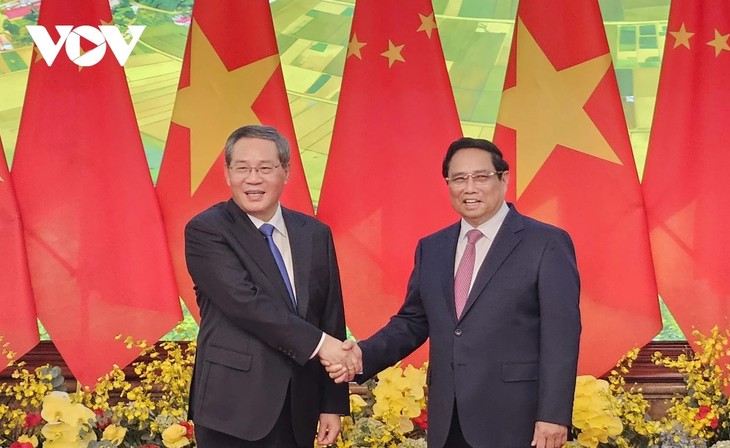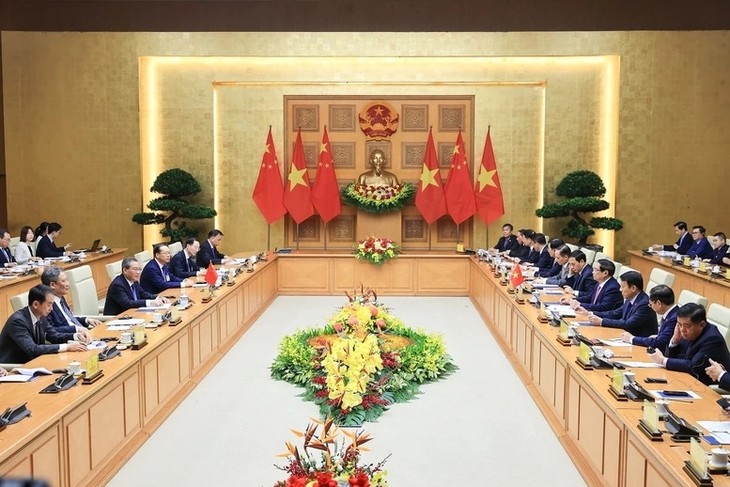(VOVWORLD) - Vietnamese Prime Minister Pham Minh Chinh held talks with Chinese Premier Li Qiang after hosting an official welcome ceremony for the latter in Hanoi on Sunday.
 Vietnamese Prime Minister Pham Minh Chinh and Chinese Premier Li Qiang Vietnamese Prime Minister Pham Minh Chinh and Chinese Premier Li Qiang |
Chinh welcomed Li’s official visit to Vietnam, which is also the first by a Chinese Premier over the past 11 years.
The two leaders agreed to effectively realise the common perceptions reached by the top leaders of the two Parties and nations; continue consolidating political trust and maintaining regular meetings and exchanges at all levels. They committed to enhancing mechanisms for exchanges and cooperation, particularly in diplomacy, national defence and public security; promoting practical cooperation in key areas, increasing people-to-people exchanges, and reinforcing the solid social foundation for the development of the Vietnam-China relations.
 Vietnamese Prime Minister Pham Minh Chinh and Chinese Premier Li Qiang hold talks Vietnamese Prime Minister Pham Minh Chinh and Chinese Premier Li Qiang hold talks
|
They pledged to maintain close collaboration and mutual support within multilateral mechanisms and forums; and cooperate effectively in land border management. At the talks, the two prime ministers formally announced the official operation of the Ban Gioc (Vietnam) – Detian (China) waterfall scenic area from October 15, 2024.
The Vietnamese PM suggested expediting the necessary procedures to open a Vietnamese Consulate General in Chongqing as soon as possible, further advancing trade cooperation and expanding market access for high-quality Vietnamese agricultural products, including citrus fruits, pomelo, avocado, custard apple, water apple, traditional herbal medicines of plant origin, buffalo, beef, pork, livestock and poultry products, and farm-raised ornate spiny lobster. He also requested support for establishing a Vietnamese Trade Promotion Office in Haikou this year, and more offices in Chengdu (Sichuan) and Nanjing (Jiangsu) in the near future.
He called for improved customs clearance efficiency at border gates, advancing “soft connectivity” through smart customs, and launching new models for cross-border economic cooperation between Vietnam and China.
Chinh called for collaboration to effectively realize signed railway cooperation documents, further cooperation in renewable energy, supporting industries, electric vehicles, international financial centres, free trade zones, smart cities, digital economy, green economy, and circular economy.
Li affirmed China's readiness to work with Vietnam to foster the political foundation and practical cooperation.
He pledged that China will further open its doors for Vietnamese goods, particularly agricultural and aquatic products, and high-quality fruits, and coordinate to facilitate quarantine and customs procedures, stressing China stands ready to resolve trade policy issues to ensure sustainable and growing bilateral trade.
The Premier suggested the two nations enhance strategic connectivity, especially in transport infrastructure; promote cooperation in economy, trade, and investment, especially in manufacturing, processing, agriculture, supply and production chain maintenance, and vocational training; and expand finance-monetary collaboration, making the bilateral cooperation more effective and practical.
The two sides exchanged sincere and straightforward views on maritime issues, and agreed to continue strictly implement the high-level common perceptions and the agreement on basic principles guiding the resolution of maritime issues between Vietnam and China, appropriately managing differences, and actively seeking mutually-acceptable, fundamental, and long-term solutions in line with the agreement on basic principles guiding the resolution of maritime issues and international law, including the 1982 United Nations Convention on the Law of the Sea (UNCLOS). They agreed to avoid actions that could complicate the situation and to maintain stability at sea together, while effectively implementing negotiation mechanisms on maritime issues, and actively promoting cooperation in less sensitive areas as well as search and rescue operations at sea.
At the end of the talks, the two leaders witnessed the exchange of 10 cooperation documents in the sectors of transport connectivity, customs, public welfare, education, agricultural product trade, media, and banking.